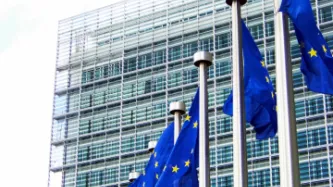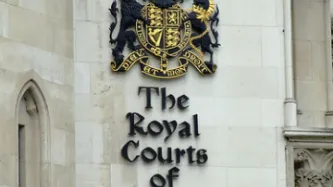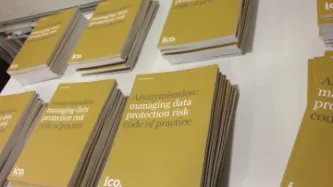Search
Content type: Advocacy
What do Egypt, Kenya, Turkey, Guinea, and Sweden have in common? Despite having a Constitutional right to privacy, they are adopting and enforcing policies that directly challenge this human right.
These states are also up for a Universal Periodic Review this year before the United Nations Human Rights Council. UPRs are a mechanism within the Council aimed at improving the human rights situation in all countries and address human rights violations wherever they occur.
Despite having…
Content type: News & Analysis
NETMundial – a global conference initiated by the Brazilian government – has produced ‘The Multi-stakeholder Statement of São Paulo’, a Roadmap and Principles on internet governance that could herald new respect for the right to privacy online. However, the outcome document fails to adequately recognise the relationship between internet governance and mass surveillance, reflecting a larger problem that was present throughout the two-day meeting.
By the end of the conference, both the…
Content type: News & Analysis
We, and other privacy advocates, havecriticised the poor provisions of the so-called Safe Harbour agreement, which allows free transfers of personal information from European countries to companies in the United States that have signed up and promise to abide by its Principles. Now the European Commission, prompted by the recent mass surveillance scandals, has published an investigation into this agreement which provides overwhelming evidence that it is not fit for purpose. It…
Content type: News & Analysis
At the first major discussions on internet governance since the Snowden leaks began in June 2013, Sweden’s Foreign Minister has called for the establishment of principles to define the application of existing human rights obligations to the digital realm.
Noting that the Snowden revelations have given birth to “a new debate about surveillance and privacy”, Foreign Minister Carl Bildt acknowledged that internet governance is being challenged, as some States operate vast surveillance…
Content type: News & Analysis
The European Parliament Committee that deals with civil liberties and justice issues will have a first vote this week on the revised European data protection framework after months and months of deliberations and negotiations over more than 4,000 amendments. The vote is the first on the framework, which will decide the future of privacy and data protection in Europe. The recent revelations surrounding government surveillance involving some of the Internet's biggest companies have highlighted…
Content type: News & Analysis
The argument that human rights are a Western concept and that privacy is not a concern for the developing world was rejected last week in a two-day civil society seminar held in Dakar, Senegal.
More than 30 members of West African civil society participated in the seminar on privacy and data protection, organised by Jonction with the support of the Senegalese Commission for Data Protection. Participants denounced the shortcomings of governments and the private sector in…
Content type: News & Analysis
All across the U.S. on 4 July, thousands of Americans gathered at Restore the Fourth rallies, in support of restoring the Fourth Amendment of the U.S. Constitution and to protest the recently-disclosed information regarding NSA spying on American citizens. Demonstrations took place in over 100 cities, calling on the U.S. government to respect the privacy rights of citizens in America and individuals around the world.
With all this talk of constitutional …
Content type: News & Analysis
Compulsory data on every state school pupil in the country can now be used for research “promoting the education or well-being of children in England”, according to UK Department for Education.
The Department’s response to the highly worrying National Pupil Database (NPD), released in late May, is far narrower than previously suggested late last year, with none of the deeply troubling aspects being included in the final proposals, and existing definitions of terms…
Content type: News & Analysis
We very much welcome today's announcement by Health Secretary Jeremy Hunt that people will be allowed to opt out of having their medical records shared in the NHS England centralised information bank.
The move is an important one for data privacy and patient choice, and has been a key objective of Privacy International in our collaboration with the new medConfidential (which launched yesterday). A month ago, NHS England (and the Director of…
Content type: News & Analysis
"This judgment exposes the widespread and sinister nature of police surveillance of ordinary members of the public in this country. It also acts as a safeguard against the creeping criminalisation of peaceful protest. The Association of Police Officers and Metropolitan Police Commissioner have sanctioned this unlawful conduct for almost a decade and must be made accountable”.
Last week three of the country’s most senior judges in the Court of Appeal found that the Association of Chief Police…
Content type: News & Analysis
The drive for accountability in aid spending has put humanitarian and development agencies under pressure to collect an ever-growing amount of data about those who receive their assistance. Donors also increasingly demand that new technologies are deployed to ensure aid reaches those it is targeted at; preventing people from fraudulently using refugees’ identities, for example, was a key motivation behind UNHCR’s recent introduction of biometric technology to register Syrian…
Content type: Press release
A European privacy group claimed today that dozens of amendments to the new Data Protection Regulation being proposed by Members of the European Parliament (MEPs) are being copied word-for-word from corporate lobby papers, with MEPs frequently failing to even remember their own amendments. Max Schrems, of the website and campaign Europe v Facebook, noticed striking similarities between proposed amendments and lobby papers written by representatives of Amazon, eBay, the American Chamber of…
Content type: News & Analysis
Today is Data Privacy Day, which commemorates the 1981 signing of the Coucil of Europe's Convention 108, the first legally binding international treaty dealing with privacy and data protection. It is celebrated all over Europe, as well as in Canada and the United States since 2008. To mark the occasion, Privacy International, together with other prominent privacy and digital rights organisations, is launching the Brussels Declaration. It urges Brussels parliamentarians and European…
Content type: News & Analysis
On International Data Privacy Day, it is important that we all ask ourselves: who has access to our personal information? Who can find out where we’ve been and who we’ve called, who can read our emails and our text messages? Who can find which websites we access and which files we download?
Statistics released by Google and Twitter over the past week are a sobering reminder that it is not only the corporations to which we consensually provide this information which are able…
Content type: Press release
Google's latest Transparency Report, released at 3pm GMT this afternoon, shows that requests by European governments for the browsing history, email communications, documents and IP addresses of Google's users have skyrocketed since the Transparency Report was launched three years ago. Countries in the European Union made 7,254 requests about 9,240 users or accounts between July and December 2012, averaging over 1,200 requests a month. This represents over a third of all requests made by…
Content type: News & Analysis
A full analysis of the UK Information Commissioner's "Anonymisation code of practice: managing data protection risk" will take time and working knowledge of how the code is used in practice.
At the launch, the ICO signalled that while they believed the code was now up to scratch, they were open to additions and clarifications given that it is the first document of its kind in the world. We applaud them for this; the code is likely to be copied internationally, so it is particularly…
Content type: News & Analysis
Next week, the European Parliament will make an important decision affecting one of the world’s most vulnerable and stigmatised groups of people: asylum seekers. This decision is part of a larger debate about privacy and function creep, about authorities breaking promises that were made when personal information was collected and using it for new purposes.
EURODAC, a transnational database containing the personal and biometric information of all asylum seekers and illegal immigrants found…
Content type: News & Analysis
Tuesday’s letter to Google CEO Larry Page, personally signed by 29 European data protection authorities, ordered the corporation (inter alia) to give users greater control over their personal information. The notions of trust and control are emphasised throughout the letter, and Google is urged to "…develop new tools to give users more control over their personal data" and "collect explicit consent for the combination of data for certain purposes". It is good news that the…
Content type: News & Analysis
Greek newspaper To Vima reported late last night that Golden Dawn MP Ilias Panagiotaros has requested the exact data of "foreign infants and young children, by country of origin, who are in nursery schools" in Greece from the Greek Ministry of Interior (the equivalent of the British Home Office or US State Department). To Vima’s headline read 'Taking a leaf out of Herod’s book'.
The request echoes earlier demands made by the party for information about immigrants’ use…
Content type: News & Analysis
APEC privacy activity has passed another milestone with the acceptance in July 2012 of the USA as the first economy to formally join the cross border privacy rules (CBPR) system. The CBPR Joint Oversight Panel (JOP), with the Canadian chair of the Data Privacy Subgroup (DPS) standing in for the US member in accordance with the ‘no conflict of interest’ provisions, accepted the US government application, which nominated the Federal Trade Commission (FTC) as the privacy enforcement authority…
Content type: News & Analysis
Privacy International welcomes the Select Committee Inquiry. We approach the proposed EU Data Protection Framework from the perspective of individual citizens and consumers.
We consider that this Inquiry and other consultations must take into account not just considerations of burdens to business and administrations, but also the fundamental rights of individuals to privacy and data protection that the UK has to comply with as a signatory to EU treaties and conventions.
The…
Content type: Advocacy
On 25th January 2012, the European Commission published a proposal that would comprehensively reform the European data protection legal regime. One aspect of its proposal, a new Regulation (the “Proposed Regulation”),(1) would modernise and further harmonise the data protection regime created by the Data Protection Directive (95/46/EC). Another aspect of the Commission’s proposal, a new Directive(2) (the “Proposed Directive”), would set out new rules on “the protection of individuals with…
Content type: News & Analysis
On 25th January 2012, the European Commission published a proposal that would comprehensively reform the European data protection legal regime. One aspect of its proposal, a new Regulation (the “Proposed Regulation”),1 would modernise and further harmonise the data protection regime created by the Data Protection Directive (95/46/EC). Another aspect of the Commission’s proposal, a new Directive2 (the “Proposed Directive”), would set out new rules on “the protection of individuals with…
Content type: Advocacy
On 25th January 2012, the European Commission published a proposal that would comprehensively reform the European data protection legal regime. One aspect of the proposal, a new Regulation (the “Proposed Regulation”),1 would modernise and further harmonise the data protection regime created by the Data Protection Directive (95/46/EC). Another aspect of the Commission’s proposal, a new Directive (the “Proposed Directive”), would set out new rules on “the protection of individuals with…
Content type: News & Analysis
On 25th January 2012, the European Commission published a proposal that would comprehensively reform the European data protection legal regime. One aspect of the proposal, a new Regulation (the “Proposed Regulation”),1 would modernise and further harmonise the data protection regime created by the Data Protection Directive (95/46/EC). Another aspect of the Commission’s proposal, a new Directive (the “Proposed Directive”), would set out new rules on “the protection of individuals with…
Content type: News & Analysis
As part of the government’s ambitious Open Data programme, the Cabinet Office announced last year that data from the National Pupil Database (NPD) will be made freely available and accessible to all. The NPD, previously only available to researchers on an academic licence, contains a record for every single state school pupil in the country, covering educational attainment from reception to sixth form, as well as characteristics such as attendance, ethnic background and free…
Content type: News & Analysis
By now, UK internet users are probably familiar with major sites asking them to consent to the use of website cookies. This is prompted by the 'cookie law' (aka "Directive 2002/58 on Privacy and Electronic Communications", otherwise known as the E-Privacy Directive), which is proving a privacy trainwreck. Theoretically, the Directive was a good idea - a method of preventing companies secretly following a user from site to site across the web. However, ill-executed law can be worse than no law…
Content type: News & Analysis
Privacy is internationally recognized as a fundamental right. Yet the confines of the right to privacy are subject to never-ending games of tug-of-war between individuals, governments and corporations. These games are rarely fair – individuals are often under-informed and lack the capacity to assert and protect their privacy, while those who seek to erode it are increasingly overbearing and secretive. This is particularly the case in developing countries, where the absence of adequate legal and…
Content type: Press release
PI, Genewatch and the Council for Responsible Genetics launch the Forensic Genetic Policy Initiative
Today, 60 countries worldwide operate national DNA databases, and at least 34 more are considering putting them in place. The use of DNA evidence in criminal investigations can bring great benefits to society, helping to solve crimes, convict the guilty and exonerate the innocent. However, the mass storage of DNA samples and computerized profiles in databases raises important human rights concerns. Your DNA profile can be used to track you or your relatives. Your DNA sample has the…
Content type: News & Analysis
A widely-leaked version of the first legislative proposal for a General Data Protection Regulation is making its way through Brussels and beyond. The purpose of this 'Regulation' is to provide a new tool for harmonising the protection of personal data across the European Union, and one that takes into consideration the current legislative and technological environment. The key point is that Europe's rules on privacy are often taken as an example to the world -- and provide a rare…


























